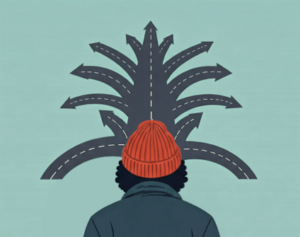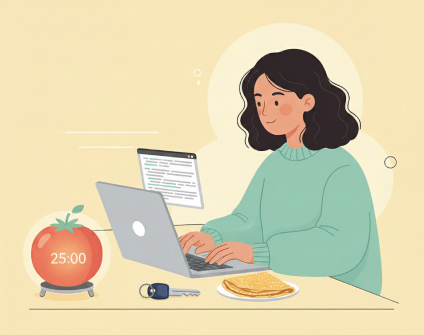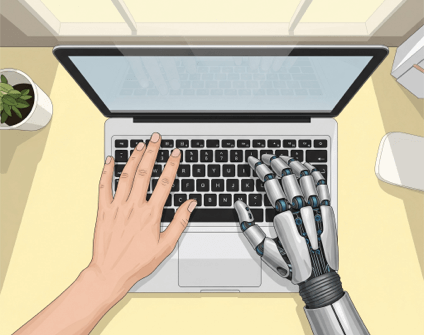Every day, our minds face a relentless stream of decisions, from simple choices like what to wear to life-altering ones that shape our future. This constant mental workload can take a toll, draining our energy and focus. What if you could bypass this common challenge with a few well-crafted strategies?
Decision fatigue is not just about mental exhaustion; it’s about reclaiming your cognitive bandwidth for what truly matters. As Barack Obama once said, “You’ll see I wear only gray or blue suits. I’m trying to pare down decisions. I don’t want to make decisions about what I’m eating or wearing. Because I have too many other decisions to make.” Let’s explore five refreshing and unconventional strategies to help you beat decision fatigue and make each choice count.
The Science of Decision Fatigue
Decision fatigue stems from the brain’s limited capacity for decision-making. The prefrontal cortex—the region responsible for complex thinking and decision-making—requires significant energy to function optimally. As you make more decisions throughout the day, this energy depletes, leading to poorer judgment and impulsivity.
A groundbreaking study by psychologist Roy Baumeister revealed that willpower and decision-making draw from the same mental reservoir. When this reservoir is depleted, people are more likely to procrastinate, make hasty choices, or avoid decisions altogether. Neurologically, this process is tied to the diminishing efficiency of glucose metabolism in the brain, which is vital for maintaining focus and clarity.

1. Limit Decision Windows
Instead of spreading decisions throughout the day, designate specific time windows for decision-making. This reduces mental wear-and-tear by consolidating cognitive effort.
How to Apply This:
- Reserve 30 minutes in the morning or evening for making all non-urgent decisions, like meal planning, emails or Errands.
- Align high-stakes decisions with your peak mental energy times, typically mid-morning or early afternoon.
Real-Life Example: Jeff Bezos refers to high-quality decisions as “one-way doors,” which are worth addressing during peak mental clarity. For everything else, stick to your decision window and move on.
How Planndu Helps: Planndu allows you to schedule decision windows and set reminders, ensuring you focus on critical choices at the right time. You can also tag tasks as “high-priority” to align them with your most productive hours.

2. Create a “Decision-Free Zone”
Set aside certain parts of your day or specific environments where no decisions are required. This “mental oasis” lets your brain recover without interruptions.
How to Apply This:
- Dedicate your first 30 minutes after waking up to a fixed routine: drink water, meditate, or journal without deviation.
- Create a work zone where your only task is deep work—no emails, no notifications, and no interruptions.
Surprising Hack: Use playlists or scents to reinforce decision-free zones. For example, always play the same instrumental music during your morning routine to signal “no decisions required here.”
How Planndu Helps: Our gratitude journal template makes it easy to reflect on the positive moments in your day. With prompts designed to guide your thoughts, you can cultivate a habit of gratitude that boosts your mood and enhances well-being.

3. Adopt the “Rule of 3”
Before making a decision, reduce your options to no more than three. The human brain struggles with processing too many choices simultaneously, and limiting options creates clarity.
How to Apply This:
- When shopping, pre-select three items that fit your criteria and choose from them.
- For daily priorities, focus on completing just three key tasks rather than juggling a massive to-do list.
Pro Insight: Warren Buffett says, “The difference between successful people and really successful people is that really successful people say no to almost everything.” Use the Rule of 3 to simplify your life.
How Planndu Helps: Our app’s priority setting feature allows you to highlight three key tasks for the day, keeping you focused and avoiding overwhelming to-do lists.

4. Practice Pre-Commitment
Remove decision-making entirely by pre-committing to certain choices ahead of time. This hack relies on making decisions when you’re least fatigued, so you’re not caught off guard later.
How to Apply This:
- Sign up for recurring services like subscription meal kits or automated grocery delivery.
- Decide on workout times and book classes in advance so you’re less likely to skip them.
Advanced Tip: Apply pre-commitment to social events by RSVPing early and sticking to your decision, avoiding last-minute “should I go or not?” dilemmas.
How Planndu Helps: Planndu’s calendar integration and recurring task feature to pre-schedule decisions and automate repetitive commitments, giving you peace of mind.

5. Incorporate Micro-Breaks with Novelty
Sometimes, decision fatigue isn’t just about the number of decisions but the monotony of the process. Micro-breaks infused with novelty can reset your mental state and improve decision-making.
How to Apply This:
- Take 5–10-minute breaks during long stretches of decision-making, and do something novel like exploring a new app, solving a short puzzle, or even stepping outside to observe nature.
- Use “novelty triggers” like changing your workspace setup or drinking a uniquely flavored tea to refresh your brain.
Unique Hack: Engage in “micro-learning” during breaks—watch a quick video or read a short article about something unrelated to your work. It gives your brain a fresh perspective and reduces mental fatigue.
How Planndu Helps: Our Pomodoro timer helps you stay focused with 25-minute work intervals and 5-minute breaks. Use the breaks for quick, refreshing activities to boost energy and maintain productivity.

Decision fatigue is not about avoiding choices but managing them smarter. By implementing these fresh strategies you’ll reclaim your mental clarity and make decisions with greater confidence.
“Once you make a decision, the universe conspires to make it happen.” — Ralph Waldo Emerson




